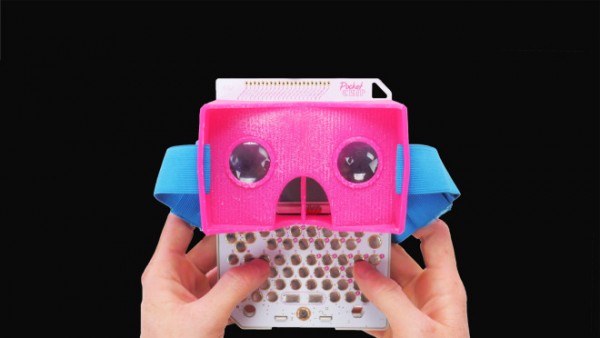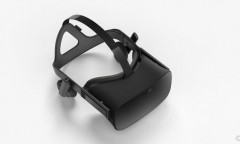By Steve Pak, | April 09, 2016

Pockulus VR Headset
Google Cardboard has become the most popular low-priced virtual reality headset on the market, but it requires users to insert a smartphone. Pockulus is a stand-alone portable game console that functions like the VR viewer from the Alphabet company, but does not require a mobile phone to function. It is powered by a tiny computer called CHIP and includes a 3D-printed face mask.
Like Us on Facebook
Pockulus attaches to a user's face like the Cardboard viewer. Meanwhile, the circuit board has a rock-bottom $9 price tag.
The budget VR headset was developed by Oakland-based Next Thing Co. It is building on the success of the tiny CHIP computer by developing new applications. However, the concept of the chip powering a VR viewer resulted from an April Fools' Day joke, according to Wired.
When customers unbox their Pockulus headset they will see a small handheld device that looks somewhat like a DIY Nintendo GameBoy. It becomes a VR viewer by 3D printing the bezel that fits the gadget's display over a user's face.
Dave Rauchwerk is one of the CHIP's creators. He noted that many companies are developing stand-alone VR headsets so the company had the idea to build one with a CHIP unit.
Besides Google Cardboard, other VR headsets on the market or scheduled to launch this year include Oculus Rift, HTC Vive, Sony's PlayStation VR, and Samsung's Gear VR.
Next Thing is also the company that invented the DIY GameBoy device, which also costs $49. The bundle includes a CHIP computer, 4.3-inch screen, and QWERTY keypad.
CHIP is a powerful CPU. It runs Linux; and includes a web browser, word processor, games, and software to make music. It also has built-in Wi-Fi connectivity, storage, and battery.
Pockulus owners are using the device to play DIY 3D games, and some 3D games that Nintendo made in the 1990s for the Virtual Boy handheld console, including Tetris and Super Mario.
In related news, HTC is allowing VR fans the chance to test Vive headsets at some Microsoft and GameStop locations, according to Polygon. The demo units will be featured at up to 30 Microsoft stores, and 10 GameStop stores. In addition, the VR headsets will be demoed with over 120 virtual reality titles on Steam.
Here's an HTC Vive review:
-
Use of Coronavirus Pandemic Drones Raises Privacy Concerns: Drones Spread Fear, Local Officials Say

-
Coronavirus Hampers The Delivery Of Lockheed Martin F-35 Stealth Fighters For 2020

-
Instagram Speeds Up Plans to Add Account Memorialization Feature Due to COVID-19 Deaths

-
NASA: Perseverance Plans to Bring 'Mars Rock' to Earth in 2031

-
600 Dead And 3,000 In The Hospital as Iranians Believed Drinking High-Concentrations of Alcohol Can Cure The Coronavirus

-
600 Dead And 3,000 In The Hospital as Iranians Believed Drinking High-Concentrations of Alcohol Can Cure The Coronavirus

-
COVID-19: Doctors, Nurses Use Virtual Reality to Learn New Skills in Treating Coronavirus Patients











